Stephen Morris's Blog
November 28, 2023
Golden Calf
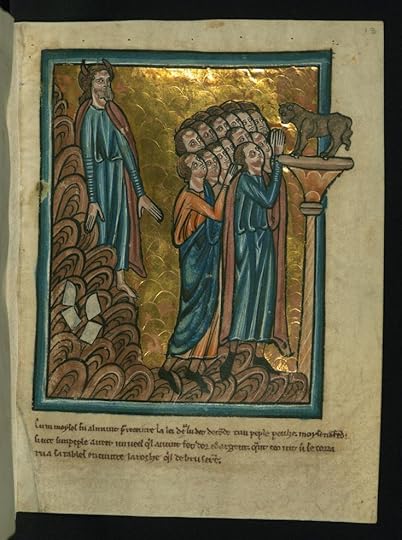 Medieval manuscript depiction of Moses seeing the Hebrews worshipping the golden calf.
Medieval manuscript depiction of Moses seeing the Hebrews worshipping the golden calf.Aaron made a golden calf for the Hebrews to worship when Moses disappeared for six weeks high atop Mt. Sinai. What was he thinking?!
Aaron probably did not think of the golden calf as an “idol,” per se. Often, the image of a calf or bull was thought to be the throne of a god; the god was seated in the empty space between the horns of the animal. When God gave directions for making the ark of the covenant, he promised that his glory would dwell atop the ark, between the two cherubim at each end of the ark’s lid; this was a very similar idea to what Aaron probably thought he was doing. He was making a throne for God, whom his brother Moses had gone up the mountain to meet.
Why a calf rather than a bull? A calf—a young cow—might have reminded Aaron of Hathor, the goddess of Egypt who was a maternal figure, nurturing and sustaining the people. She fed the people, much as God fed the Hebrews with quail and manna. She helped people cross from life to death, not so unlike the Lord delivering the Hebrews through the Red Sea. (Hathor was the great Mother before Isis was.) She was also associated with the land of Canaan—exactly the place the Hebrews hoped to journey to through the wilderness. Maybe Aaron thought that Hathor’s cow horns would be an appropriate throne for the God of Israel.
This might explain what Aaron did but does it excuse what he did? Although he made the calf, he was not subjected to the consequences and punishment for worshiping the calf—he was not forced to drink the gold dust water and he was not killed by the Levites when Moses came back to the Hebrew camp. So Moses might have understood Aaron’s motivation although disagreeing with his brother’s behavior.
How do we make a golden calf for ourselves? How do our motives seem reasonable though our actions are not? How do we accidentally make idols for ourselves or others? Anytime we let something—even a good thing, such as providing for our families—become the most important thing in our lives, we have constructed an idol. We make a throne for God in our hearts but then the throne itself is mistaken for the One who is enthroned.
Read more about the golden calf here and here.
The post Golden Calf appeared first on Stephen Morris, author.
October 31, 2023
We Have Heard With Our Ears
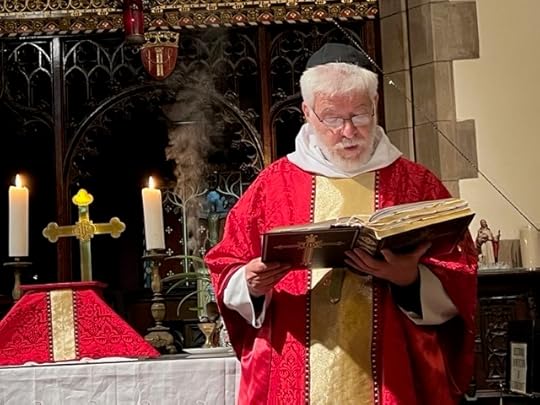 The proclamation of the Epistle on St. Luke’s day (photo by Kate Stronk)
The proclamation of the Epistle on St. Luke’s day (photo by Kate Stronk)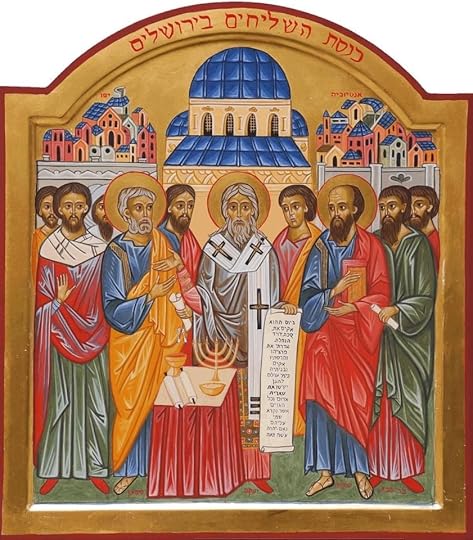 St. James proclaims the decision of the apostolic council
St. James proclaims the decision of the apostolic council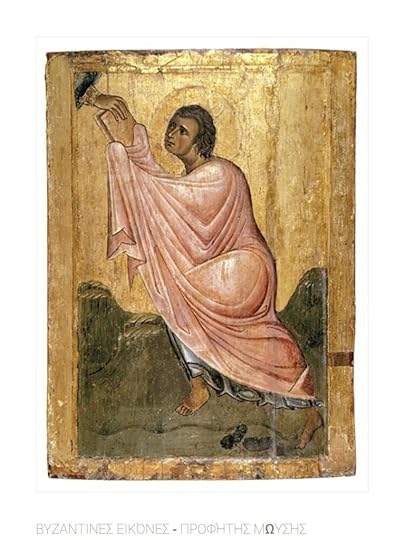 Moses receives the Word to proclaim to the judges of Israel
Moses receives the Word to proclaim to the judges of IsraelWhen Moses went and told the people all the Lord’s words and laws, they responded with one voice, “Everything the Lord has said we will do.” Moses then wrote down everything the Lord had said. (Exodus 24:3-4)
Nowadays most Americans think their experience of God should be intellectual and cerebral. They expect to encounter God by reading or in a text. They discount the importance of their bodies when experiencing the divine. They often think that they cannot experience God except in their minds. Many are sure that what they think is more important than what they do.
Throughout the Bible, however, people do not encounter God by reading but by their hearing or with their eyes. Exodus 24 describes how the 70 leaders and judges of the Israelite clans gathered at Mt. Sinai heard Moses proclaim the covenant and commandments long before they were written down. On the foothills of Mt. Sinai, these 70 judges saw the same thing St. John saw in the Book of Revelation: the Lord enthroned in glory on a sapphire pavement brighter and more pure than the sky. They glimpsed eternity.
Jesus said, “Blessed are those who hear the word of God and keep it.” He is that divine Word. It is by hearing that we encounter the Word made flesh and his words. Jesus told the apostles, “Many prophets longed to see what you see.” The apostles saw the Word made flesh. During the pandemic, we learned again about how important it is—that it is possible—to receive Holy Communion with our eyes when we cannot receive the Sacred Host in our mouths.
We turn to God so that we can hear him. We open our eyes so that we can see him. In Psalm 40, King David says, “You have given me ears to hear you.” The epistle to the Hebrews quotes this, understanding Christ as the one whose ears hear what the Father says. The prophet Isaiah picks up on this theme as well, speaking for the Messiah: “The Lord God wakens my ear to hear as the learned” (Isaiah 50). What we hear, what we listen to you shapes and forms us in fundamental ways. Who we listen to reveals who we are and who we want to be.
The Word was meant to be heard, not read. This was due, in part, to widespread illiteracy and the difficulty of having books easily accessible. But even when more people can read and books are available, the Word is still meant to be heard. The Word is meant to be experienced viscerally, in our guts not just in our heads. Even when we pray —by ourselves in our rooms—the words of our prayer should be heard and not just recited in our heads; all the spiritual guides have always taught that we should move our lips and feel our breath forming the words of our prayer even if we cannot hear them. We pray with our whole bodies, not just our heads. Never just with our heads.
Listening to the Word of God, experiencing the divine with our ears forms us to be the Body we want to be. We want to hear the Word of God and keep it. We want to hear the Word of God and become that word ourselves. We need to practice listening on a daily basis and cut through the inner static or feedback we all have in our heads. Slowly reading a psalm every day helps us do this. Sitting quietly for a few minutes and saying the Jesus Prayer, “Jesus, Son of David, have mercy on me” (Luke 18:38) can help us do this.
“Behold, I stand at the door and knock. If anyone hears my voice and opens the door, I will come in to him and eat with him, and he with me” (Revelation 3:20).
The post We Have Heard With Our Ears appeared first on Stephen Morris, author.
October 24, 2023
I am Sending my Angel
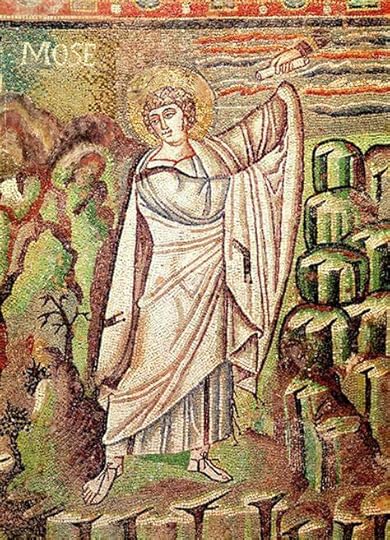 Moses receiving the Law on Mt. Sinai from the Logos
Moses receiving the Law on Mt. Sinai from the Logos 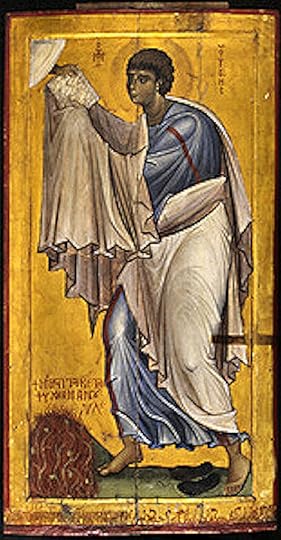
See, I am sending my angel ahead of you to guard you along the way and to bring you to the place I have prepared. (Exodus 23:20)
The Lord promises Moses that not just any angel but MY angel will lead the Chosen People to the Promised Land. This particular angel–named Metatron in Jewish folklore but sometimes also identified with Michael–would be the guardian angel of the people, just as each nation/language group–there were thought to be 70 or 72 such “nations”–had a guardian angel.
Christians understand this reference to MY angel, however, to be either the Holy Spirit or the Logos himself. (As Christians understand the Logos to be the divine Person speaking with Moses, it seems more consistent that the reference to “my angel” would be the Spirit rather than the Logos referring to himself in this way.) Almost all the appearances of “God” or “the Lord” in the Old Testament are understood to be the Logos, anticipating his coming among us; throughout the Gospel According to St. John, the point is made that no mortal has ever met or seen or experienced the Father–only the Son, who reveals the character of the Father by the Son’s self-revelation.
Prophets, such as Malachi, also refer to “God’s angel” in a way that Christians understand to be referring to the Logos. The angel who appeared in the fiery furnace in the book of Daniel is understood to be the Logos, the divine messenger sent to protect the three young men. As “angel” means “messenger,” it is one way that early Christians understood Christ: he is the divine messenger of the Father.
As theology became more sophisticated, Christians understood this understanding of Christ as an “angel” was inadequate. But many were reluctant to abandon theological language that had been in use since the earliest days. It was this adherence to a previous “orthodoxy” that came to be known as heresy–heresy meaning “choice” and it was a choice to reject the theological advances of the Church as she came to understand Christ more clearly.
Faithful adherence to Tradition or stubborn heretical obstinacy … a fine line divides these two attitudes. Only by faithful discernment, “listening,” can we distinguish between them as the Church adjusts her language so that the Gospel can be clearly understood in new times and places. The message must remain the same even as vocabulary changes.
The post I am Sending my Angel appeared first on Stephen Morris, author.
October 17, 2023
“Do not boil a kid in its mother’s milk”
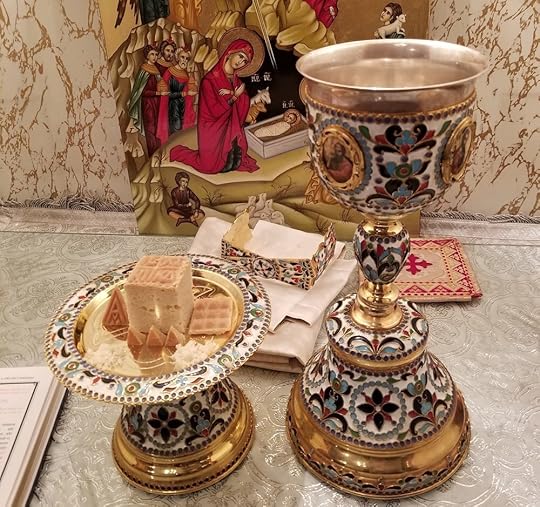
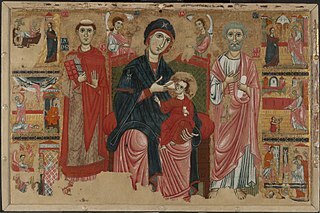
“Do not cook a young goat in its mother’s milk.” (Exodus 23:19)
I remember as an undergraduate that someone read this verse and gasped, “Who would boil a kid in its mother’s milk!?” They were aghast at such an idea and it took several minutes for them to understand this the “kid” in question was a baby goat, not a human child.
Even so, few people would cook goat in milk nowadays. But no one makes rules about things that don’t happen. So we can deduce that several non-Israelite cultures in the Middle East evidently did cook goat in milk—a kind of cream-of-goat soup or a stew with a splash of milk in it—and the point of this command is that the Hebrews should not cook in the same ways as their neighbors.
The Hebrews already understood that they should not eat meat with “the life” (blood) still in it. Now they are told not to cook meat with milk. Is there a connection?
In the ancient and medieval worlds—really, until the early 1700s—milk and semen were thought to be blood that various organs (breasts and testes) had heated until it became warm and frothy. Blood, milk, and semen were all the same bodily fluid at different temperatures. So the command not to cook with milk is equivalent to being told not to eat meat with blood still in it.
Because of this identification of blood/milk, preachers have identified the Blood of Christ in Holy Communion with the milk Mother Church suckles her children—the Faithful—with. (In the second-third century, newly baptized people would receive the Precious Blood from one chalice and warm milk with honey from another chalice because they had been brought in to the Church, the true Promised Land that flows with milk and honey.) As Christ identified himself with a mother hen who gathers her chicks beneath her wings to protect them, his Blood is also the milk that sustains the newborn Christian who is newly baptized.
Images of the Blessed Virgin nursing the Christ Child is a Eucharistic image. She nurtured her Child with her milk, which is her blood. That milk/blood then becomes Christ’s own body/blood as a child. As he grows, that body/blood grow and mature and he then gives us his Body/Blood in Holy Communion. Everything human about Christ was given to him by his mother; we participate in his family connections when we participate in him. Body/Blood are fundamental to our humanity and sharing his, we share in everyone who also shares in him. (Read more about the Nursing Madonna here.)
Most Christians still refused to eat meat with blood in it until the 1600-1700s. Nowadays few people cook goat with milk but that’s because cuisine habits have changed, not because milk is still identified as a variation of blood. We forget how differently our Christian ancestors lived and what they took for granted; what do we think is self-evident today that will surprise Christians in three hundred years?
The post “Do not boil a kid in its mother’s milk” appeared first on Stephen Morris, author.
October 3, 2023
Murder in the Dark? Or the Second Coming?
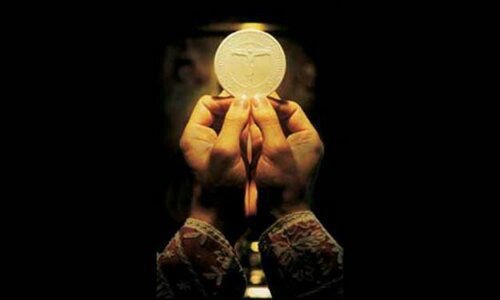
 Breaking the Holy Bread is often thought to be the signal that Christ is about to come again. “The Breaking of the Bread” often stands in as the name of the whole celebration of the Holy Communion in the Acts of the Apostles.
Breaking the Holy Bread is often thought to be the signal that Christ is about to come again. “The Breaking of the Bread” often stands in as the name of the whole celebration of the Holy Communion in the Acts of the Apostles.If someone breaks into my house at night and I kill them, I’m not guilty of murder. But if the sun has begun to rise when my home is broken into, then I am guilty of murder if I kill the intruder. (Exodus 22) What’s the reason for this distinction?
Modern electricity makes us forget how dark a dark night can really be. If I kill an intruder in the middle of the night, the presumption would be that I couldn’t see who it was and couldn’t really aim —with a bat? A club? A knife or sword?—at the intruder. But if the sun has began to rise, then I can presumably see well enough to simply injure—rather than kill— the intruder.
It was dangerous in the dark. In the days before modern police or electricity, no one walked around at night unless they could afford a bodyguard. If I invited people to my house for dinner, that generally meant they would spend the night and sleep over at my house as well because it would not be safe for them to go home in the dark.
Jesus told many stories about how he would come a second time, at the End of Days, in the middle of the night. Suddenly. Unexpectedly. Without warning. Like an intruder or a thief breaking into a house. This second coming in the middle of the night was especially expected by early Christians at the Easter Vigil as the priest broke the Bread for distribution in Holy Communion. If the priest broke the Holy Bread and Christ did not return, Communion would continue as usual and the faithful would begin hoping that next year’s Easter Vigil would be the End of Days.
This expectation that Christ would return at the Breaking of the Bread came to be associated with the celebration of Holy Communion each Sunday as well. It became customary for the priest to break the Holy Bread and then pause, waiting to see if Christ would return to judge the world. If not, then Holy Communion would continue. But the whole congregation would hold their collective breath as the Bread was broken, waiting—hoping?—that today would be the day that time would end and Jesus would return.
“For when peaceful stillness encompassed everything and the night in its swift course was half spent, your all-powerful Word from heaven’s royal throne leapt down into the doomed land ….” (Wisdom 18:14-15) This description of the night of the Passover in Egypt, when the firstborn died and Moses led the Hebrews to freedom, has also been seen as a description of the first Holy Saturday (when Christ smashed the gates of Death) as well as Christmas Eve (when the Word was born in Bethlehem). It can also be the description of the End of Time as the priest breaks the Holy Bread at the Easter Vigil. Darkness can be dangerous. Darkness can also be the time of salvation.
Read about Wisdom 18 as a description of Christmas Eve here.
The post Murder in the Dark? Or the Second Coming? appeared first on Stephen Morris, author.
September 26, 2023
Bulls and Justice
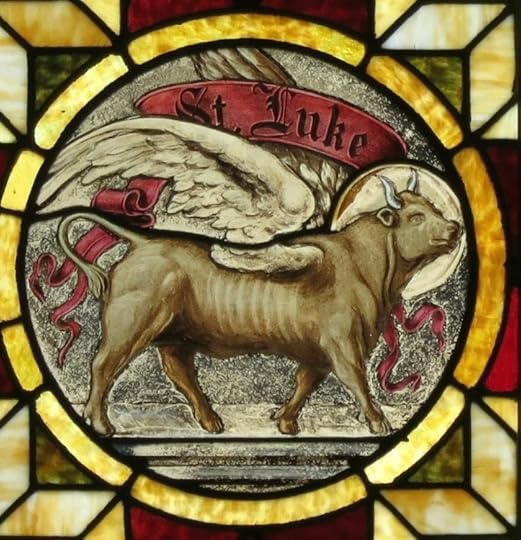 T
T The bull is typically associated with St. Luke because his gospel opens with events in the Temple connected to the priests offering sacrifices of incense—and possibly bulls. Bulls were extremely valuable animals and important sacrificial offerings. Bulls were also such strong animals that they frequently stood in as images for gods, such as the two bulls one of the idolatrous kings of Israel made in 1 Kings 12.
The bull is typically associated with St. Luke because his gospel opens with events in the Temple connected to the priests offering sacrifices of incense—and possibly bulls. Bulls were extremely valuable animals and important sacrificial offerings. Bulls were also such strong animals that they frequently stood in as images for gods, such as the two bulls one of the idolatrous kings of Israel made in 1 Kings 12.Bulls gore people. That’s what bulls do. That’s what makes Spanish bull fights exciting. It’s what makes bull herding dangerous. It’s what makes bulls dangerous to have around.
There are several commands about bulls in Exodus 21, just after Moses has been given the Ten Commandments. The text gives us three chapters of additional commandments before telling us that Moses went down from Mt. Sinai to discover that the people had begun to worship the golden calf. It’s as if the authors or editors of Exodus want us to understand that these commandments are the most important of all the commandments that were given after the Ten Commandments themselves on the two tablets of stone. Why are these commandments about bulls so important?
These commandments about bulls are important because of the possible danger to the people living in communities together. Rules for how to live together peacefully were important; rules about safety and how to settle disputes were especially important for the well-being of the People of God.
The rules about bull violence are very detailed and spell out what to do if the bull injures or kills a male or female slave, a free man, or a pregnant woman or her baby. Consequences vary, depending on if the bull has been known to injure people before or if the bull escaped its enclosure accidentally or if the owner was careless in his bull-tending.
Bulls were extremely valuable animals; anyone who owned a bull was—by definition—a rich man. Having to kill a bull that had killed someone was a severe financial loss on top of any fines the bull’s owner might be expected to pay to the community. Offering a bull voluntarily as a sacrifice was extremely expensive; such a sacrifice was especially valuable and precious.
Settling disputes involving bulls could easily become simply a matter of “might makes right” and the wealthy getting their way without any consequences for bad behavior. By having such complex rules for all the various possible situations involving violence done by bulls, Moses and Israelite society were attempting to use the law to guarantee the rights and safety of everyone, especially the poor. Throughout the Old Testament, the opposite of poverty is not wealth; throughout the Old Testament, the opposite of poverty is Justice. These rules about bulls and violence were meant to foster a just, law-abiding society. These rules were about making a society capable of welcoming the Sun of Justice when he came.
Bulls could be an image of the God of Israel (as in the psalms) or the image of a non-Israelite god. Read more about bulls in the Bible here.
The post Bulls and Justice appeared first on Stephen Morris, author.
September 12, 2023
Violence, Altars, and Modest Priests?
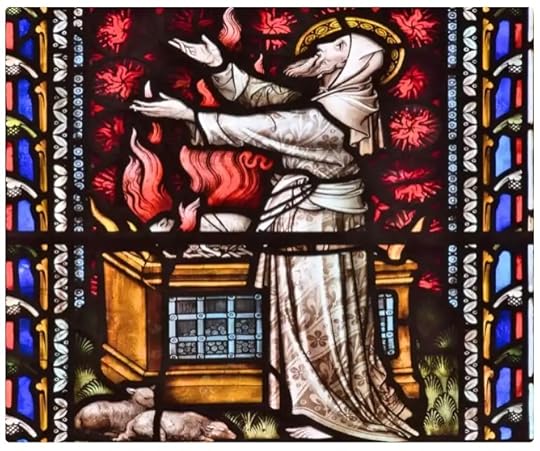 Aaron, brother of Moses, offers sacrifice as High Priest.
Aaron, brother of Moses, offers sacrifice as High Priest. This stained glass window can be found in
Cathedral of Our Lady and St Philip Howard, Arundel
And the LORD said to Moses, “Thus you shall say to the people of Israel: ‘You have seen for yourselves that I have talked with you from heaven. You shall not make gods of silver to be with me, nor shall you make for yourselves gods of gold. An altar of earth you shall make for me and sacrifice on it your burnt offerings and your peace offering, your sheep and your oxen. In every place where I cause my name to be remembered I will come to you and. If you make me an altar of stone, you shall not build it of hewn stones, for if you wield your tool on it you profane it. And you shall not go up by steps to my altar, that your nakedness be not exposed on it. (Exodus 20:22-26)
Moses has just received the Ten Commandments and then God repeats what seems to be what he considers to be the most important commandment: “Do not worship any idols.” This is the summary of the Ten because authentic worship of the living God—not the futile worship of an idol, which stands for what does not exist or is untrue—covers and includes all the other commandments, just as Jesus summarizes the Law: “Love God …. Love your neighbor.”
Idol worship is not devil worship; an idol is not a devil, according to St. Paul. An idol is “no thing,” something that doesn’t exist. But we can insert ourselves into that empty space. Nature abhors a vacuum and we are made to worship. We will worship ourselves if we are not worshipping the true God.
Then God tells Moses, “Don’t use tools of violence to make an altar.” An altar is a place of peacemaking: making peace between God and humanity, God and specific persons, God and the whole created order. The place of such peacemaking should not be fashioned with iron tools (weapons). The sacrifice itself is violent enough.
Sacrifices were bloody affairs. Priests would cut the throat of the offered animal and blood would gush everywhere. He would catch the blood in a bowl. He would sprinkle the blood on the altar and the people. He would butcher the animal, cutting out the organs and cut the body into pieces; these organs and body parts—cuts of meat—would be roasted on the altar.
This was all very bloody, messy business. Priests wore very little as they did this, unlike the stained glass window of Aaron above. The vestments most priests wore during the actual sacrifice were loin clothes. (High priests would wear special vestments in certain occasions but these were constantly in need of being replaced because it was so hard to get the bloodstains out of the vestments.)
Because the vestments were so skimpy, it would be easy to see underneath the priestly loin cloth if the priest went up a few steps to the altar. So the altar was not meant to be more than a single step higher than the people on whose behalf the priest was making the sacrifice so that no one could see his nakedness.
Just like people are always wondering what a man is wearing under a kilt, people would peak to see what the priest had on under his loincloth vestment.
The post Violence, Altars, and Modest Priests? appeared first on Stephen Morris, author.
September 5, 2023
Thou shalt not kill?
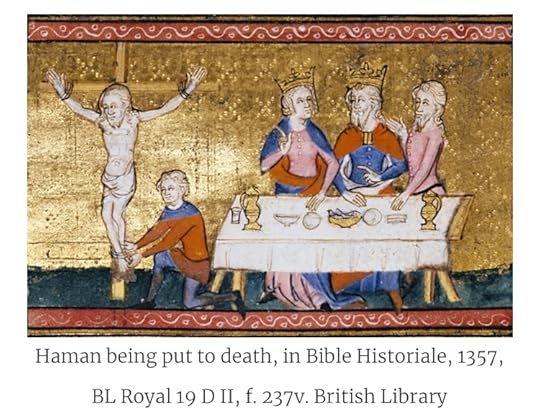
Do not kill. Do no murder.
This commandment can be translated many ways. They word “kill” is often translated both ways; in other texts, when this word refers to one person, it is generally translated as “kill” but as “murder” when it refers to more than one victim.
And yet there were many commandments that come with the death penalty attached. Some infractions were punished by stoning. Others were to be punished by death but no specific method of execution was stipulated. There must have been a caste of executioners in ancient Israel, similar to the priesthood, but there is no record of them. (Just as there was a caste or guild of executioners in medieval Europe, these people would know the proper methods for killing and executing people as well as the rules governing when-where-how to execute as well as the disposal of the bodies of the executed, who were generally considered ineligible for burial in standard burial grounds.)
There were also the commands that Joshua, Saul, and other ancient leaders of Israel received to commit genocide: the complete extermination of people already living in certain areas, non-Israelites occupying territory that God was giving to Israel. Slaves could be killed by their master for almost any reason—or no reason—with no consequences for the master but if killed by someone else, the killer owed a fine to the master to sample up for his lost “property.”
“Murder” is clearly not the same as “killing.” Modern law distinguishes many kinds of homocide, including manslaughter, self-defense, various degrees of murder (involving how much planning and intention the perpetrator engaged in), and accidents.
Even killing in self-defense has been treated differently by differing Christian traditions. Latin-speaking Christians said that self-defense was justified and carried no penalty; this line of thought eventually led to the “just war” theory. Greek-speaking Christians said that even justified self-defense was a traumatic experience and a person needs to undergo a modified penance to process-deal-come to terms with the experience.
Medieval Christians also gendered killing and murder differently. Killing, a strategic behavior of soldiers, was a masculine act; murder, a spontaneous or vengeful or duplicitous act, was a feminine act. Men who murdered were considered less than “real men;” women, such as a queen, who led battles or engaged in military operations, were “manly women.”
Read more about capital punishment in the Old Testament here.
The post Thou shalt not kill? appeared first on Stephen Morris, author.
August 29, 2023
No Adultery? No Killing?
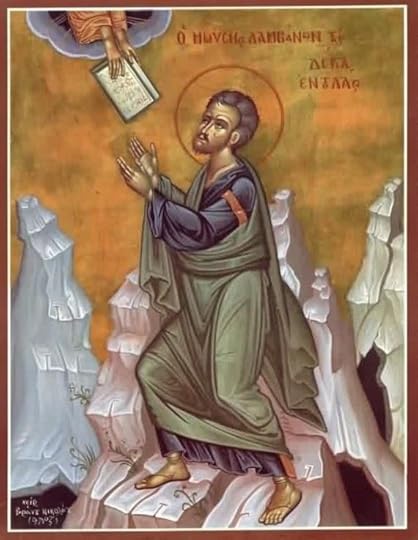 A contemporary icon of Moses receiving the 10 Commandments on Mt. Sinai. Moses looks surprisingly spry and young, unlike the bushy-bearded, white-haired Charlton Heston in the movie depiction of this event! Moses is typically depicted as a young or middle-aged man with a very trim beard in icons, rather than as an unkempt senior citizen. This makes it easier to distinguish him from the prophets, who are usually depicted as older man with longer beards, like Elijah in the Transfiguration icon.
A contemporary icon of Moses receiving the 10 Commandments on Mt. Sinai. Moses looks surprisingly spry and young, unlike the bushy-bearded, white-haired Charlton Heston in the movie depiction of this event! Moses is typically depicted as a young or middle-aged man with a very trim beard in icons, rather than as an unkempt senior citizen. This makes it easier to distinguish him from the prophets, who are usually depicted as older man with longer beards, like Elijah in the Transfiguration icon.Don’t kill (or “murder”). Don’t commit adultery. Don’t steal.
These commandments in Exodus 20 are terse. Direct. To the point.
οὐ φονεύσεις
οὐ μοιχεύσεις
οὐ κλέψεις
Aren’t these obvious? We think we know what these mean. We all know about murder from watching police shows like “Law and Order.” Adultery means an unsanctioned sexual relationship with a married person. Don’t take what belongs to someone else. But these forbidden actions are not really as straightforward as we like to think.
For instance, “adultery” ( μοιχεύσεις ) is a very complicated concept. Nowadays, we think this means an affair between married people. But in classic biblical and canon law, when a married woman has an affair with someone, it is called “adultery.” When an unmarried woman has an affair, it is called “fornication.” The marital status of the man is never considered by biblical or canon law; when a man has an affair, he is guilty of fornication–whether he is married or not. That doesn’t sound fair to our modern ears but that’s the way biblical and canon law developed.
A second marriage can also be considered “adultery”–even if the first spouse is dead. It depends on whether the marriage is considered a contract (which expires when one partner dies) or a covenant (which never expires, even if one partner dies). Canon law in the Greek and Russian churches consider marriage a covenant; western Christians have generally considered marriage a contract. But not always.
If a first marriage ends in divorce, the second marriage can also be considered adultery unless one of the former partners asks a bishop to declare the first marriage “dead”–the relationship has died–or “null.” If the first marriage is declared null, that means the proper conditions for making the contract or the covenant were never fulfilled so there was no marriage in the first place and the first marriage is deemed to have been simply “legal fornication.”
Understanding who has–or has not–committed adultery can be a long, torturous process that can cause a lot of heartache. Israel’s worship of pagan gods is always called adultery by the prophets because Israel was said to be married to God. The worship of foreign gods also caused a lot of heartache among the Chosen People and resulted in wars, civil wars, exiles, and famines when God called the people back to fidelity with him. The Church is also considered the Bride of Christ and when we turn our backs on him and worship anything else–including our own opinions!–we are also committing a kind of adultery. But how many of us admit that?
What about murder or killing? Aren’t those straightforward legal concepts? Let’s look at those next week!
The post No Adultery? No Killing? appeared first on Stephen Morris, author.
August 22, 2023
Remember—Even Before it Happens!
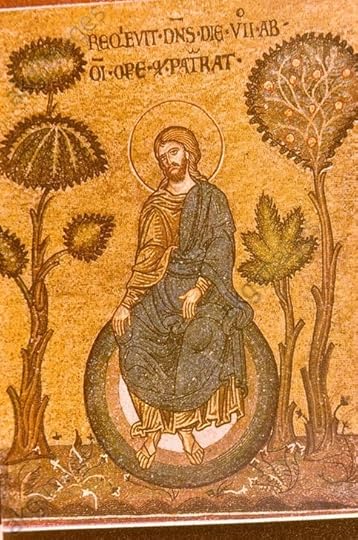 God rests on 7th Day of Creation/ Mosaic Monreale (Sicily), Cathedral. – Mosaic, 12th/13th century. Centre aisle, south wall.
God rests on 7th Day of Creation/ Mosaic Monreale (Sicily), Cathedral. – Mosaic, 12th/13th century. Centre aisle, south wall.“Remember the Sabbath day, to keep it holy.” (Exodus 20:8)
The 10 Commandments are prefaced with the proclamation that Israel ought to keep the commandments because “I am the Lord your God, who brought you out of Egypt, out of the land of slavery.” The delivery from Egypt is what obliges Israel to keep the commandments as an act of gratitude. But the Sabbath is different—Sabbath is hardwired into the DNA of creation because God rested on the Sabbath when making the world.
The command to “Remember!” the Sabbath is not the same word as in the command, “Do this in remembrance of me” at the Last Supper. Remembrance of the Sabbath is the Future Passive Indicative 2nd Singular form of the verb, meaning “you shall remember,” or “you shall recall,” “you shall think about,” “you shall be aware of.”
This form of “remember” is always looking ahead to something. The people are told to always live in expectation, in anticipation of the next Sabbath. The Sabbath is the chronological icon of the Kingdom of God: just as we are called to always live in expectation and hope for the Kingdom, the 10 Commandments tell the people to always live in expectation and hope of the next Sabbath. They-and we-are called to focus on the future, where we are going rather than being focused on the past, where we have been and what we have done. We look ahead and we hope.
Several years ago, I was on West 14 Street several times a week during the summer for various regular errands. There was a street-lady, disheveled and unkempt, who walked backward pushing the shopping cart of her possessions nearly every day. In the Old Testament, she would have been hailed as a prophet enacting a sermon everyday, a living example of how people spend more time paying attention to where they have been and despairing over or being proud of what they have done rather than paying attention to where they are going and hopeful about opportunities and challenges ahead.
In modern Greek, this form of the verb has become the word for “fiancé.” This suggests that the Sabbath is the “engagement ring” given by God to his bride, Israel. Many of the prophets refer to the forty years that Israel spent in the wilderness as their honeymoon period with God.
Sabbath has always been respected in the Christian liturgical practice even as Sunday, the weekly anniversary of the Resurrection, became the principal day of Christian worship. Of course, the Great Sabbath—the ultimate day of rest—is the blessed Sabbath that Christ spent resting in the tomb, during which he descended into Hell to harrow [demolish] it. The engagement of God to Israel is fulfilled when Death and all-that-opposes-God is destroyed and the wedding celebration described in the Apocalypse [Book of Revelation] begins.
(Readers will recall that the Greek text of the Old Testament was compiled in 300 BC while the standard Hebrew text as we now have it is only as old as the First Crusade , AD 1000. The Septuagint, 1300 years older than the Hebrew text that survives, is a more reliable witness—translated by Jewish scholars for Jewish readers—to the original text. I’m classical Christian thought, the medieval Hebrew is a commentary on the text rather than the source of the text itself.)
The post Remember—Even Before it Happens! appeared first on Stephen Morris, author.



